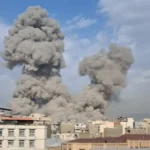
With the death of Yahya Sinwar, Israel believes it has weakened Hamas, but the group promises immediate retaliation. See the exclusive details!
The first photos posted on social media of Hamas leader Yahya Sinwar, dead inside what appears to be a partially demolished house in Gaza, may not have been what Israeli leaders wanted the world to see.
It has been suggested that the soldiers who found the body and suspected it to be Sinwar’s hurriedly photographed it and sent the photos to some acquaintances, who in turn published them for the world to see.
His superiors had a different narrative in mind about how the man died. They would have preferred to depict a Hamas leader hiding in a tunnel, using Israeli hostages as human shields. The truth is that Hamas’s main leader lost his life fighting his enemies.
Additionally, the photos show a gunshot wound to the head. He was not trying to escape, as Israeli Prime Minister Benjamin Netanyahu would like the world to believe, but died in a direct confrontation with Israeli soldiers, face to face.
From a Palestinian perspective, this would be considered the most noble and honorable of deaths.
Undisputed leader
Yahya Sinwar, or Abu Ibrahim as he is known in Hamas circles, was born in the Khan Younis refugee camp in the Gaza Strip in October 1962 to a family of refugees from the Palestinian city of Majdal. In 1948, Zionist militias occupied the city during the Palestinian Nakba (the creation of the State of Israel) and renamed it Ashkelon.
Like many other residents of areas north of Gaza, which overnight became part of the “State of Israel,” Sinwar’s family fled south, seeking what they thought would be temporary refuge.
All of these refugees believed that, in a few days, they would be back home, as soon as troops from neighboring Arab countries came to their aid, protecting their cities and towns and repelling the Jewish militias who carried out massacres to expel the Palestinian population. That didn’t happen.
Sinwar attended school in Gaza and studied Arabic Literature at the Islamic University. He was an active student in high school and university, where he joined the Palestine chapter of the Muslim Brotherhood. He was first detained by the Israelis at the age of 20, in 1982 for 10 months, and again in 1985 for eight months.
When Hamas was founded in 1987, Sinwar emerged as one of its main operatives and was tasked by Hamas founder Sheikh Ahmad Yassin with setting up a security apparatus known as the Majd. One of the objectives was to identify, pursue and punish collaborators who informed the Israeli occupation forces about Palestinian activists in the strip.
Before long, he was arrested in 1988 and sentenced to four life sentences for the kidnapping and murder of two Israeli soldiers and the murder of four Palestinians suspected of collaborating with Israel.
He remained imprisoned in Israel for 23 years, during which time he learned Hebrew and translated or wrote several books. He also played an important role in managing the affairs of Hamas detainees and coordinating relations and resolving disputes with detainees from other factions.
In 2011, he was one of more than a thousand Palestinian prisoners released in exchange for Israeli soldier Gilad Shalit. After his release, Sinwar held senior positions within the movement.
Just a year after being released, he was elected in 2012 as a member of Hamas’ political cabinet and played a leading role in running the movement’s military wing, the Izziddin Al-Qassam Brigades.
Sinwar gained further prominence in 2021 when he was elected head of Hamas in Gaza. That was the year that tensions in Jerusalem, due to repeated attempts by Jewish settlers to invade the Al-Aqsa Mosque and Israeli restrictions imposed on Palestinian worshippers, triggered another war in Gaza, which lasted 11 days.
This was Israel’s fourth major attack on Gaza in 14 years. There was much devastation and hundreds of victims. However, the war cemented Sinwar as the undisputed leader of the enclave.
According to a recent report from New York Timesciting Hamas documents that the Israelis allegedly found on a laptop in Gaza, Sinwar and a tight circle of comrades began preparing for a major offensive against Israel as early as 2021.
Following Israel’s assassination of Ismail Haniyeh in Tehran on July 31, 2024, the Hamas Shura Council named Sinwar as Haniyeh’s successor on August 5, after long deliberations and much speculation.
This surprised many observers.
A resilient movement
Under the convention, this position would normally be filled by a Hamas figure in the diaspora, due to the political and diplomatic tasks the position entails, which require freedom of movement.
Khaled Meshaal was seen by many as the likely candidate. However, Meshaal refused the appointment and insisted that Gaza, which had been resisting Israeli aggression, should have the right to lead the movement during this critical period.
Israel has managed to almost decapitate the movement many times before. However, it failed to weaken his resolve, much less crush it.
While Sinwar’s death is seen as another major blow to Hamas, it is highly unlikely to affect its long-term strategy.
Israel has already managed to almost decapitate the movement several times. However, it failed to weaken his resolve, much less crush it.
The list of key leaders eliminated since Hamas’ emergence on the Palestinian scene in the late 1980s is long. It includes the movement’s founder, Sheikh Yassin, on March 21, 2004, and his successor, Abd al-Aziz al-Rantisi, on April 17, 2004.
The leader of Hamas’ military wing, Ahmed al-Jaabari, was assassinated on November 14, 2012. More recently, the Israelis assassinated Hamas deputy leader Salih al-Arouri on January 2, 2024, and the leader politician, Ismail Haniyeh, on July 31.
Motion resilience is due to two factors. First, Hamas defends an idea: that the Palestinians once had a homeland that was taken from them to make way for the creation of a Jewish homeland, considered a century ago as the solution to Europe’s Jewish problem.
Palestinians have been fighting to return home for more than three-quarters of a century.
The emergence of Hamas was a consequence not only of the Palestinian intifada, which broke out the day before the birth of the movement, but also of the decision by the leadership of the Palestine Liberation Organization (PLO) under Yasser Arafat to renounce resistance in favor of a settlement of peace with Israel. This proved to be a total failure, nothing short of a capitulation.
Over time, Hamas grew stronger, while the PLO lost its status as a representative of the Palestinian cause for the majority of Palestinians. The Oslo Accords between the PLO and Israel merely transformed the former into a collaborative security agency in the service of the latter.
Since 1993, Palestinians have seen more land confiscated, more homes demolished, and more sons and daughters killed, maimed, or imprisoned by the Israelis.
The promised Palestinian state never materialized, and the two-state solution became a mirage as Jewish settlements occupied much of the Palestinian territories in the West Bank and East Jerusalem.
The second factor is that Hamas is an institutional movement with an elected leadership. There is no cult of personality, and leaders who die are quickly and smoothly replaced.
It remains to be seen who will succeed Sinwar. Maybe this time it will be someone from the diaspora.
It is possible that the movement will decide, for now, to have a deputy leader until the elections are held. However, elections are unlikely to take place until after the war, something difficult to predict as the conflict appears to expand beyond Palestine and threaten the entire region.
No end in sight
Finally, despite loss, martyrdom has always been a powerful recruiting tool. In Palestinian culture – as in Islamic culture – martyrdom is not seen as a loss, but as a gain.
Sinwar, like all his predecessors murdered by Israel, will be celebrated by many as a great martyr who died fighting invaders.
There is speculation whether Sinwar’s death will pave the way for the end of the war soon.
The war could end if Israel agrees to the terms of a ceasefire already accepted by Hamas and originally proposed by US President Joe Biden.
However, if Netanyahu still insists on destroying Hamas and releasing the hostages without offering anything in return, it is highly unlikely that we will see an end to the fighting anytime soon.
Of course, there is a risk that the elimination
of Sinwar further encourage Netanyahu, especially in the context of the upcoming US elections, which he was eagerly awaiting.
The war will likely intensify if Iran is retaliated against for its latest attack. It all depends on the targets Israel chooses inside Iran.
As for the conflict, even if this war ends, it is unlikely that the region will remain at peace as long as Palestinians are deprived of their basic rights and as long as the Israeli occupation continues.
Source: https://www.ocafezinho.com/2024/10/18/hamas-perde-yahya-sinwar-mas-movimento-promete-vinganca-e-continuidade/

